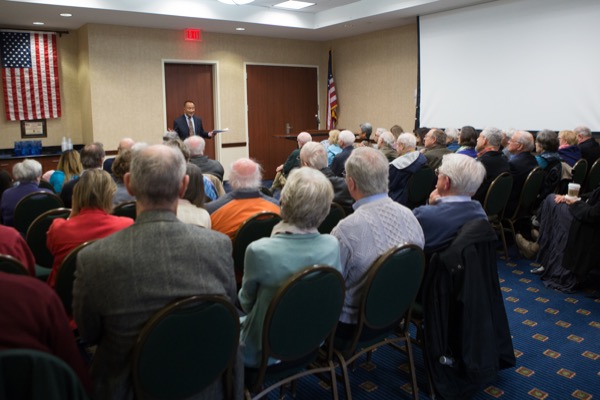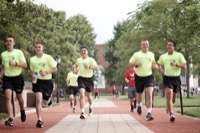UDARF series
S.B. Woo tells retired faculty of his journey in academia, politics
9 a.m., April 17, 2015--During a long and interesting career in academia and public service, S.B. Woo, professor emeritus of physics at the University of Delaware, was never known to shy away from controversial issues or potentially sensitive situations.
Woo shared his journey -- from assistant professor of physics to faculty union chief negotiator, to UD Board of Trustees member, to lieutenant governor of the state of Delaware -- with many of his former colleagues during a “My Intellectual Journey” lecture sponsored by the UD Association of Retired Faculty (UDARF) on Thursday, April 9, in the Courtyard Newark-University of Delaware campus hotel.
People Stories
'Resilience Engineering'
Reviresco June run
“The title of my talk is supposed to be ‘My Intellectual Journey,’” Woo said. “I would like it changed to ‘How I benefited from the blessings of liberty in the United States of America, my chosen country.’”
Woo received his undergraduate degrees in mathematics and physics from Georgetown College in Kentucky, and his doctorate in physics from Washington University in St. Louis, Missouri.
“My journey was very different and interesting,” Woo said. “People would tell me that I was silly to take on some of the things that I did, but somehow, I got away with it.”
Arriving at UD in 1966 as an assistant professor of physics, Woo later became chief negotiator for the UD chapter of the American Association of University Professors (AAUP), the national organization representing college and university faculty members exclusively.
In the first round of a four-way competition held in May 1972, the AAUP had won the right to become the collective bargaining unit for members of the UD faculty.
“We had to learn everything about negotiating. The pressure was hard, and there were disagreements within the collective bargaining team, but we never had a fight or a quarrel,” Woo recalled. “I learned a lot from my colleagues and listened to them, and they respected my decisions.”
A large share of the credit for an amiable settlement resided with Leon Campbell, newly appointed as provost and soon-to-be chief negotiator for the administration, Woo said.
“Both Leon Campbell and I knew that despite the tension of the first few bargaining sessions, and the temporary quarrel of the two parties, both sides deeply loved UD,” Woo said. “Provost Campbell thought that in such an unmovable conflict, it was up to the stronger side to understand the viewpoints of the weaker side and step back for the long-term harmony.”
Woo considers Campbell the hero of the event because he tried to find an alternative solution.
“I believe we had the support of the faculty, but the administration could easily have refused to yield,” Woo said. “This would have resulted in really bitter feelings in the teaching faculty and the administration for years or perhaps decades to come.”
The lessons learned from that experience would later influence Woo’s thinking on finding alternative solutions to seemingly unresolvable conflicts at home and abroad.
“As I get older, I project my little experience during that conflict into the conflict between political parties in Washington, D.C., and those between nations,” Woo said. “I feel that if all sides held to the principle that it’s up to the stronger side to step back, it would result in a permanent harmony where all sides could move forward.”
Following his term as chief negotiator, Woo was appointed to the UD Board of Trustees in 1976 by Gov. Sherman W. Tribbett, which began the tradition of having a UD faculty member on the board.
When his term on the board was up in 1982, Woo asked Gov. Pierre S. du Pont not to appoint him to a second term as a trustee, opting instead to toss his hat into the ring of First State politics.
“I was asked why I decided to run for lieutenant governor,” Woo said. “At the time, my response was that I thought it was the highest position that I would ever be able to win.”
A Democrat, Woo noted that his victory over Republican candidate Battle B. Robinson -- the assistant legal counsel to Gov. du Pont, who was leaving office -- came by just 425 votes and earned him the nickname of “Landslide Woo.”
In the state’s unique political structure, he served as a Democratic lieutenant governor under Republican Gov. Michael N. Castle.
“The question was whether or not voters would elect a lieutenant governor who was an immigrant and spoke with an accent,” Woo said. “Only in America and only in Delaware could an immigrant win an election like this.”
Although his run for the U.S. Senate in 1988 against William V. Roth was not so successful, Woo said he still enjoyed his interesting journey in academia and politics.
“Someone once told me I had planned my career very well,” said Woo, who retired in 2002. “I replied that I never planned my career. I believe that you make your own difference in the environment that you are in.”
Article by Jerry Rhodes
Photos by Ambre Alexander Payne












